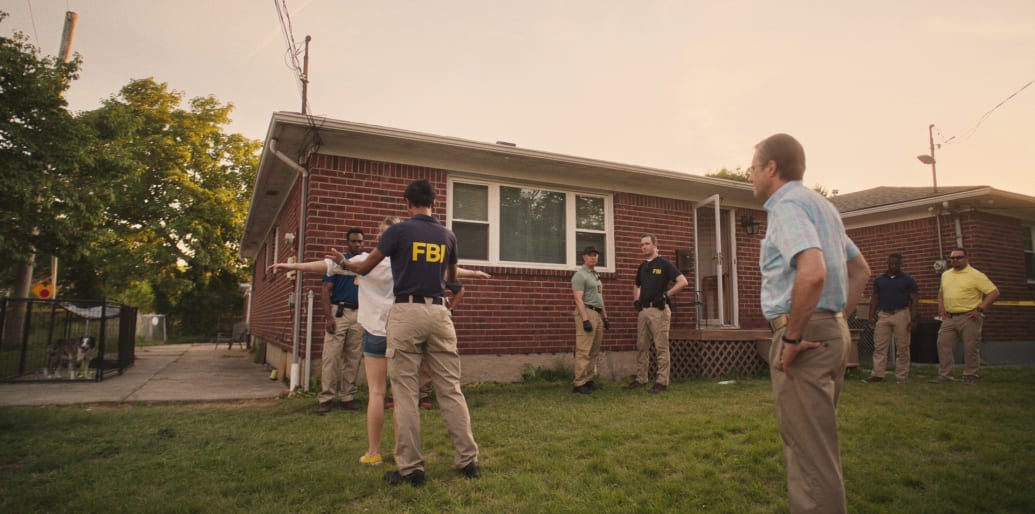Traitor or patriot—that’s the question lingering over Reality, writer/director Tina Satter’s HBO film adaptation of her Broadway play Is This a Room? about a whistleblower on the cusp of arrest. Its title is both the name of its protagonist and a reference to the nature of its tale, and Reality is a stagey dramatization about the flimsy line separating truth from lies, honor from treachery. Though its real-life story ultimately proves a little too one-note, it makes up for its thinness with a powerhouse lead turn from Sydney Sweeney as a woman caught in a nerve-wracking mess of her own making.
Its dialogue taken directly from transcripts of FBI interviews and recordings (and sometimes simultaneously depicted on-screen), Reality is set over the course of approximately two hours on June 3, 2017, at the small, one-level brick home of National Security Agency translator Reality Winner (Sweeney) in a not-very-nice section of Augusta, Georgia.
Arriving at the house with groceries in tow, Winner is greeted by Wally (Marchánt Davis) and Justin (Josh Hamilton). They’re both FBI agents, and they have a warrant to search Winner’s residence, her car, and her person—including her phone, which they request while still on the front lawn. Wearing, respectively, a short-sleeved checkerboard button-down (Justin) and an Under Armor polo shirt (Wallace) that are tucked into matching khaki pants, the men affect cheery casualness. Nonetheless, it’s clear from the get-go that this is not an informal meeting.
That impression is heightened by their ensuing chitchat about whether Winner has any firearms in the home (she does), and about their demand that she not go for them when they enter the building. Wally’s later request that Winner help unlock her phone, and then his abrupt act of pulling the device away when she tries to touch it, only reinforces the sense that, despite the sunshiny weather and pleasant talk, things are dire for Winner.
If it’s obvious that Justin and Wally are putting on a genial façade in order to obtain Winner’s cooperation, it’s likewise apparent that Winner is using superficial comments—most of them having to do with her concerns about her dog and cat, whom she fears will flee out the front door if not properly managed—to mask the fact that she knows, or at least suspects, the reason for this drop-by.
Hewing closely to the letter of its source material, Reality builds suspense not only from these characters’ charged conversations, but from a slowly developing air of menace created by the arrival of an unnamed, goateed agent in a yellow shirt and wrap-around sunglasses whose gum-chewing and hands-on-hips comportment are far from reassuring.
Alternating between claustrophobic close-ups and medium shots that accentuate Winner’s dwarfed-by-guys circumstances, director Satter creates an atmosphere of simmering anxiety. For Winner, the world soon begins to take on a strange quality, with everything—tree branches rustling in the wind, a cat sitting in a toy truck across the street—suddenly looking surreal and threatening.
Justin and Wally eventually move this confrontation inside to an empty back room that features no furniture and is illuminated by a fluorescent light. Having expressed how impressed they are with her fluency in Farsi, Dari, and Pashto, the federal agents get down to business: namely, their belief that Winner has leaked classified information.
To compel her to open up, they prod her on the nature of her work at the NSA, her background in the Air Force, her security clearance, her interest in future deployments, and her conduct at the office. Their queries suggest that they have more intel than they’re divulging, and it’s not long before Winner is coming clean, piece by piece, about her infraction, which involved printing a report about Russia’s suspected interference in the 2016 election—specifically, their hacking of voting machines—and mailing it to The Intercept for publication.
Justin and Wally want to know precisely what Winner did as well as why, and the answer to that latter issue is hinted at in the first moments of Reality, courtesy of a snapshot of Winner working at a cubicle desk beneath TVs broadcasting Fox News. The incessant blare of fascistically minded right-wing disinformation is the unspoken (and then, overtly blamed) catalyst for Winner’s crime. What’s of greater interest to the film, however, is the in-the-moment ordeal of Winner, whose nervousness initially manifests itself via her big, darting eyes and fidgety clasping/unclasping hands.
Reality is a showcase for its headliner, who captures Winner’s friendliness, caginess, and terror through gradually changing body language and a voice that starts to waver under the strain of her situation. In jean shorts, a white shirt with rolled cuffs, and hair pulled back in a braid, Sweeney makes Winner seem small and ordinary. Intermittent cutaways to her Instagram posts—concerning the (suspicious?) vacation she recently took, her competitive weightlifting, and her AR-15—contribute to a portrait of the translator as a relatively ordinary woman who, like millions of Americans circa 2017, were at their wit’s end over the incoming commander-in-chief, and who was naturally distraught and unnerved by the bright spotlight of a federal interrogation.
At the same time, though, Sweeney (like the film) never excessively courts sympathy; Winner’s true motivations remain at least partially opaque, so that it’s possible to read her (and her offense) in multiple ways.
The tension between honesty and deception is central to Reality, with regards to both Winner’s cat-and-mouse game with Justin and Wally, and the government’s concealment of bombshell revelations about Russian interference that run counter to Trump and Fox’s avalanche of denials. By confining itself to the official record, the film never develops additional dimensions that might enhance its themes.
Still, after having her actors temporarily vanish from the screen whenever they reach redacted portions of the transcript, Satter ends her story with views of the classified report in question, as well as TV news clips of media pundits debating Winner’s case—thereby providing a closing critique of our fractured national discourse, and an ambiguous statement about the justness of doing wrong for what appears to be the right reasons.





